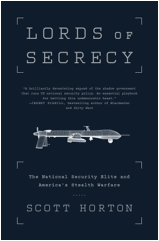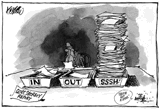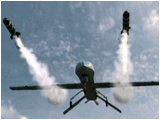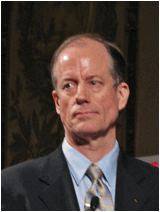
A book review published in The Whistle (Newsletter of Whistleblowers Australia), No. 83, July 2015, pp. 3-5
Open discussion is the lifeblood of a democratic society, according to Scott Horton in his new book Lords of Secrecy. With the rise of a national security elite in the US, secrecy has become excessive and dangerous. The new secrecy regime is unprecedented in US history. Part of the story is a "war on whistleblowers."

Lords of Secrecy is wide-ranging and illuminating. Before I address Horton's discussion of whistleblowing, it's useful to review earlier chapters, which deal with ancient Greek democracy, the bureaucratic addiction to secrecy, the rise of the US national security state, and stealth warfare.
Horton begins his analysis by going back to the democracies in ancient Greece. He quotes writers from that time and contemporary scholars to argue that public discussion of issues was crucial to the success of ancient Athens against its more dictatorial rivals such as Sparta.
One of the key ideas Horton takes from the experiences in ancient Athens is "knowledge-based democracy." Access to information, combined with public discussion, enables citizens to become knowledgeable, and this in turn is the most solid basis for forming wise policies. Secrecy, on the other hand, is toxic to the democratic spirit, because it permits special interests to get their way at the expense of the wider population.
Fast forwarding to the 1900s, Horton examines the rise of bureaucracy, a system of organising work involving hierarchy and a division of labour. Most large organisations, whether in governments, corporations or churches, are bureaucratic. Horton is especially interested in government bureaucracies and in one of their central tools: secrecy. Bureaucrats gain power through exclusive access to knowledge; secrecy is their preferred mode of stymieing challenges.

Horton next turns to the US national security state, which emerged in the aftermath of World War II in response to the challenge posed by the Soviet Union and in particular the development of nuclear weapons, carried out in top secrecy. The national security state in the US includes the Central Intelligence Agency and the National Security Agency. The original enabling legislation for the CIA was, according to Horton, sensitive to the dangers posed by a secrecy regime, but over several decades the bureaucratic imperative gradually overwhelmed the oversight mechanisms in the system.
Theoretically, the legislative branch of government is supposed to provide control over the unchecked growth of executive power. However, the US Congress has been inadequate to the task of reining in the ever-expanding national security state, with a primary reason being the use of secrecy. Another potential check is the courts, but these have been nobbled by secrecy, with most judges simply acquiescing to claims about national security.
So the system of representative government based on three branches - executive, legislative, judicial - that act as controls on each other has broken down in the US. The executive has emerged as dominant, with secrecy as its chosen tool to prevent scrutiny of abuses.
The system cannot police itself, so the media are vital in challenging abuses. Yet in the US the mass media have largely succumbed to government imperatives. Edward Snowden realised this and, rather than provide his material to the New York Times, went instead to the British-based Guardian.
The damage caused by excessive secrecy is shown by the rise of drone warfare. Pilotless aircraft are sent on missions, being guided by workers safe in bunkers in Nevada, to monitor and sometimes to kill targets identified as threats to the US. This is basically assassination, with the targets executed without arrest or trial.

The US drone programme has been cloaked in extreme secrecy. Massively expanded under Obama's administration, information provided to the public and media is highly selective. Few members of the public realise that drone strikes can be counterproductive. People in targeted countries, such as Pakistan, learn about strikes, including civilian casualties, and learn to hate the US. The strikes may kill a few militants, but at the expense of recruiting many more to the militants' cause. There is little public discussion of these issues because of secrecy and the servility of US mainstream media. People in Pakistan know more about the drones than US citizens.
Horton summarises his argument:
I have argued that the rising power and influence of the American national security elite are attributable mainly to the use of secrecy as a tool. In essence, classification regimes are used to lock in and control analysts down the chain of command and to exclude vital national security issues from effective public debate and hence from democratic process. Instead, only the lords of secrecy and their acolytes provide the vital information and analysis that lead to decisions on war and peace: whether troops should be committed to a struggle on foreign soil, aircraft should be deployed, or drones and cruise missiles used for strikes. (pp. 153–154)

Scott Horton
In this context, it is not surprising that the national security elite have targeted whistleblowers as threats to their secrecy regime. Horton devotes an entire chapter to "The war on whistleblowers." As part of the assault on whistleblowers, the Obama administration has used the espionage act, passed during World War I, to prosecute whistleblowers, even though no espionage is involved.
More such prosecutions have been made under Obama's presidency than under all previous presidents. However, Horton does not blame Obama, but rather the increasing power of the national security elite, and the corrosive effect of excessive secrecy. Horton does not necessarily support national security whistleblowers. For example, he is critical of WikiLeaks and Chelsea Manning. But Horton's deeper concern is that it is virtually impossible to have an informed public discussion of the issues because of the level of secrecy involving national security.
Horton notes that leaking is standard procedure by politicians and top bureaucrats, for example to test the response to proposed policies. Secrecy is used selectively. Elites can leak with impunity to serve political or personal agendas, but when lower level workers leak in the public interest, they are targeted for exemplary prosecutions. Horton discusses the cases of Stephen Kim, Jeffrey Stirling and Thomas Drake, noting that the way they have been treated has been vindictive and even counterproductive, in that they undermine respect for the secrecy system itself. Yet the national security elite cannot recognise the damage their own actions are causing because of the secrecy they impose and the consequent lack of public discussion.
Here is Horton's assessment of the espionage cases against whistleblowers.
The Justice Department may not win its cases in federal court. It may even be criticized by a federal judge who gets a clear sense of how the department's national security division abuses prosecutorial powers for the benefit of the national security state. But in the end, it can consider many lost cases as successful just the same: it has chilled the environment concerning classified information and nipped in the bud a great deal of national security reporting that would otherwise help the public understand what their government is up to.
Most significantly, it sends a clear message to would-be whistleblowers: We will destroy you. You will lose your pension, your savings, your house. You won't be able to send your children to college or find a job commensurate with your education and experience. We will make your life a never-ending hell. And the courts and your attorneys will be powerless to help you in any way. The Drake case shows us a Justice Department prepared to abuse its massive powers for the benefit of the intelligence community. It also points to the immense imbalance in power among national security prosecutors, the courts, and accused whistleblowers. (p. 139; emphasis by Horton)

Thomas Drake
The relevance of Horton's analysis to Australia is fairly obvious. Especially in the years after the 9/11 attacks and the Bali bombing, Australia's security agencies have been given massive funding increases. In Australia, government operations have always been subject to far more secrecy than in the US, and this has only been accentuated in recent years. The latest assaults on public discussion have included laws criminalising whistleblowing and journalism on national security, data retention laws that will enable tracking down leakers and leak recipients more easily, and laws against speaking out about asylum seekers in detention.
On the one hand, in Australia there are numerous whistleblower protection laws, but on the other hand the new laws show what the government really wants, namely that no one should have the temerity to expose the activities of powerful groups. Scrutiny is one way: the government reserves for itself the power to maintain surveillance over citizens, but wants to prevent citizens from exposing the crimes and follies of those at the top.
Lords of Secrecy is a powerful argument for knowledge-based democracy, in which secrecy is minimised so that public discussion can sort good ideas from bad. For whistleblowers, there are a few take-home messages. First, public discussion of contentious issues is vital for a thriving democracy. Second, secrecy is regularly used as a tool by elites to prevent discussion and scrutiny. Third, whistleblowers play an important role in challenging the secrecy system. The implication is that a good way to assess whistleblowing is whether it contributes to greater public understanding and discussion.
Scott Horton, Lords of secrecy: the national security elite and America's stealth warfare (New York: Nation Books, 2015)
Thanks to Trent Brown, Xiaoping Gao and Brendan Jones for helpful comments on a draft of this review.